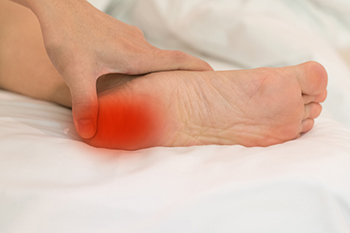
Heel pain is a common complaint among many patients visiting a podiatrist. Although there are several possible causes of this heel pain, plantar fasciitis is the likeliest. Plantar fasciitis is an inflammation of the plantar fascia tissue on the sole of the foot. This tissue connects the heel with the forefoot and can suffer damage from overuse, complications due to abnormal foot structure, improper footwear, and more. Plantar fasciitis can affect all people from athletes to ordinary people leading fairly sedentary lives. Older or obese individuals, those who stand while working, or who have flat feet or a shortened Achilles tendon, have a higher risk of developing plantar fasciitis. There are many treatment modalities that your podiatrist may discuss with you if it's determined that plantar fasciitis is the cause of your heel pain. If it's chronic and does not respond to more conservative treatments, your podiatrist may suggest corticosteroid injections. This type of anti-inflammatory medicinal treatment is believed to help reduce pain and inflammation in many patients. If you are suffering from heel pain, have a podiatrist examine you. If you are diagnosed with plantar fasciitis, consider all of the treatment options your podiatrist suggests and ask for information about whether corticosteroid injections might be right for you.
Plantar fasciitis is a common foot condition that is often caused by a strain injury. If you are experiencing heel pain or symptoms of plantar fasciitis, contact Andrew Katz, DPM from Allcare Foothealth Center. Our doctor can provide the care you need to keep you pain-free and on your feet.
What Is Plantar Fasciitis?
Plantar fasciitis is one of the most common causes of heel pain. The plantar fascia is a ligament that connects your heel to the front of your foot. When this ligament becomes inflamed, plantar fasciitis is the result. If you have plantar fasciitis you will have a stabbing pain that usually occurs with your first steps in the morning. As the day progresses and you walk around more, this pain will start to disappear, but it will return after long periods of standing or sitting.
What Causes Plantar Fasciitis?
- Excessive running
- Having high arches in your feet
- Other foot issues such as flat feet
- Pregnancy (due to the sudden weight gain)
- Being on your feet very often
There are some risk factors that may make you more likely to develop plantar fasciitis compared to others. The condition most commonly affects adults between the ages of 40 and 60. It also tends to affect people who are obese because the extra pounds result in extra stress being placed on the plantar fascia.
Prevention
- Take good care of your feet – Wear shoes that have good arch support and heel cushioning.
- Maintain a healthy weight
- If you are a runner, alternate running with other sports that won’t cause heel pain
There are a variety of treatment options available for plantar fasciitis along with the pain that accompanies it. Additionally, physical therapy is a very important component in the treatment process. It is important that you meet with your podiatrist to determine which treatment option is best for you.
If you have any questions, please feel free to contact our office located in Palmdale, CA . We offer the newest diagnostic and treatment technologies for all your foot care needs.
